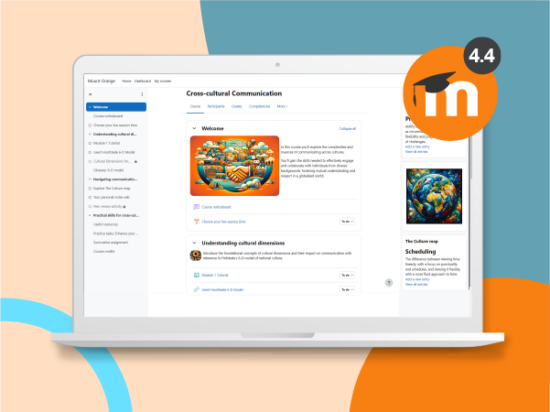Moodle Academy has released a new course, Co-Create Courses with ABC Learning Design, showing you how to co-create courses with community members. ABC Learning Design is a high-energy, hands-on curriculum development workshop developed at University College London (UCL). Moodle Academy has adopted and customed this process to co-design courses with Moodle Community members.
The Moodle Academy course is an intermediate level and if you are new to Moodle we suggest you take the Introduction to Moodle course before starting this one. Before starting the course it’s expected that you will already know how a typical online course functions. In the course you will learning how Moodle Academy uses the ABC Learning Design method to co-create courses with community members; how to produce a high-level storyboard of the student learning journey, outline each overall learning task; and how to develop a detailed plan of learning type activities for each learning task.
According to UCL, the original in-person workshop was designed to run for 90 minutes, to allow co-located “teaching teams to work together to create a visual ‘storyboard’”. Moodle Academy developed an online version of this process that can be run from different locations to accommodate members of the Moodle Community, who are not usually co-located.
The ABC Learning Design method for Moodle Academy uses the same basic concepts from the original method, but the workshop runs in just 60 minutes, and uses a variety of online tools, compared to physical worksheets. As well as being fast and accessible online, the course simplifies learning and focuses on the student journey. It encourages discussion, creativity and consensus, producing practical outcomes such as a storyboard or action list.
The six learning types
Professor Diana Laurillard from the UCL Institute of Education developed the conversation framework to describe learning from the student’s perspective. Professor Laurillard identifies six types of learning as students interact with their teacher, their learning environment, and other students. The six learning types are represented as six coloured cards in the ABC Learning Design method:
Acquisition
Learning through acquisition is when the teacher controls the learning narrative and learners are passively listening to lectures and podcasts, reading from books or websites, and watching demos or videos.
Collaboration
Collaboration is when students work together on a project where they have to produce a shared output. This type of learning is about the process of working together. Students negotiate their ideas and practise until they agree. They challenge each other and provide clear feedback to develop the best output they can.
Discussion
Learning through discussion requires the learner to articulate their ideas and questions, and to challenge and respond to the ideas and questions from the teacher and from their peers, using tools such as discussion forums and web conferencing tools.
Investigation
This type of learning guides the learner to explore, compare and critique texts, documents and resources that reflect the concepts and ideas being taught. For example, learners might use online advice and guidance; compare digital texts; and use digital tools for searching and evaluating information and ideas.
Practise
The practise enables the learner to adapt their actions to the task goal, and use the feedback to improve their next action. Feedback may come from self-reflection, from peers, from the teacher, or from the activity itself, if it shows them how to improve the result of their action in relation to the goal. For example, using quizzes with feedback, which is a commonly used method in Moodle Academy courses.
Production
Learning through production is the way the teacher motivates the learner to consolidate what they have learned by articulating their current conceptual understanding and how they used it in practise. Assessment will often require some production, such as a blog post, essay, or presenting in a webinar.
These are the six learning types that are used in the ABC Learning Design process to break down the different learning activities that students are doing. The conversational framework helps teachers consider the student learning journey by asking what kind of activity is this technology enabling the students to do which promotes an education-first approach. The teacher can then identify the best tools to fit the type of learning that best suits their learners.
Learn more by enrolling in the Moodle Academy course Co-Create Courses with ABC Learning Design to watch the recording of the course webinar, complete the assessed activities, and earn a badge.



